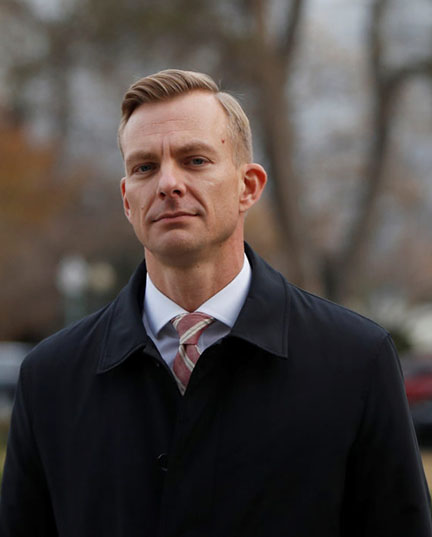WASHINGTON, (Reuters) – Democrats responded skeptically yesterday to President Donald Trump’s declaration that he might be willing to testify in his impeachment inquiry and also said they were examining the truthfulness of his testimony in the Russia 2016 election interference probe.
Trump said on Twitter that he would “strongly consider” House of Representatives Speaker Nancy Pelosi’s suggestion that he testify in the House impeachment inquiry into whether he pressured Ukraine to investigate domestic political opponent Joe Biden.
House Democrats saw his participation in the inquiry as unlikely.
“President Trump should testify,” Representative Don Beyer said in a tweet. “He should allow top White House aides to testify. … He should turn over the documents Congress subpoenaed. He should end his illegal coverup. I’m not holding my breath.”
Trump has come under increasing pressure as public hearings have started in the impeachment probe, and the Democratic-led committees conducting the investigation have released transcripts of interviews conducted in closed sessions that contain potentially damaging allegations against him.
Late on Monday, they released a transcript of an interview with David Holmes, a top aide from the U.S. Embassy in Kiev, who will testify at a public hearing on Thursday.
Holmes testified that he had overheard on July 26 a call, held on the outdoor terrace of a Kiev restaurant, between Gordon Sondland, the U.S. ambassador to the European Union, and Trump.
In the call, he testified, Trump asked Sondland whether Ukrainian President Volodomyr Zelenskiy had agreed to announce an investigation into the son of former U.S. Vice President Joe Biden, a rival in Trump’s race for re-election next year.
Holmes, an aide to acting U.S. Ambassador to Ukraine William Taylor, said he could hear the conversation and believes two others at the table could as well.
“So he’s gonna do the investigation?” Holmes said he heard Trump ask.
“He’s gonna do it,” Sondland said, adding that Zelenskiy would do “anything you ask him to.”
Holmes described the call as extraordinary.
“I’ve never seen anything like this, someone calling the President from a mobile phone at a restaurant, and then having a conversation of this level of candor, colorful language,” he said.
Holmes said he was concerned Trump’s call with Sondland could pose a security risk. “We generally assume that mobile communications in Ukraine are being monitored,” he testified.
Asked whether Ukrainian officials felt pressure to announce investigations into the Bidens, Holmes said, “I think the Ukrainians gradually came to understand that they were being asked to do something in exchange for the meeting and the security assistance hold being lifted.”
Holmes said the call – which came to light in Taylor’s testimony last week – took place one day after Trump’s July 25 telephone call with Zelenskiy, which prompted the whistleblower complaint that led to the impeachment probe of Trump.
On that call, Trump asked Zelenskiy to open a corruption investigation into Biden and his son Hunter, and into a discredited theory that Ukraine, not Russia, meddled in the 2016 U.S. election. Trump has defended his call with Zelenskiy as “perfect.”
Joe Biden is a leading contender for the Democratic nomination to take on Trump in 2020.
Separately, House general counsel Douglas Letter told a federal appeals court in Washington that lawmakers were examining the truthfulness of the written answers the president provided in former Special Counsel Robert Mueller’s investigation of Russian interference in the 2016 presidential election.
Trump initially offered to testify in that investigation but only provided written answers after months of negotiations.
Those answers drew renewed scrutiny after they appeared to conflict with the testimony of a former Trump campaign official last week in the trial of Trump ally Roger Stone.
Lawmakers are examining whether Trump abused his power by withholding $391 million in aid to Ukraine as leverage to get Kiev to investigate Biden. The money, approved by the U.S. Congress to help U.S. ally Ukraine combat Russia-backed separatists, was later provided.
The Republican president has said he did nothing wrong and has railed against the impeachment inquiry and attacked witnesses, much as he did in the two-year Mueller investigation.
Holmes is one of nine witnesses set to testify in the second week of public impeachment hearings. He will testify on Thursday.
The committees also released a transcript of testimony behind closed doors by David Hale, a senior State Department official. In his interview, Hale confirmed that he and Secretary of State Mike Pompeo knew ware of the campaign against Yovanovitch, but were not going to act on it without evidence.
Pompeo declined to discuss the impeachment inquiry – or defend Yovanovitch – at a news briefing on Monday.
Hale is set to testify at a public hearing on Wednesday.
Others due to testify this week include Sondland, whose direct contacts with Trump are likely to be a main focus in the investigation of whether the president used U.S. aid as leverage to get Zelenskiy to dig up dirt on Biden.
Trump told reporters last week that he knew “nothing” about the call with Sondland.
Several witnesses testified last week that they were alarmed at the pressure tactics used against Ukraine, as well as the role of Trump’s personal lawyer, Rudy Giuliani.
The hearings could clear the way for the House to approve articles of impeachment – formal charges – against Trump. That would lead to a trial in the Senate on whether to convict Trump and remove him from office. Republicans control the Senate and have shown little support for Trump’s removal.






